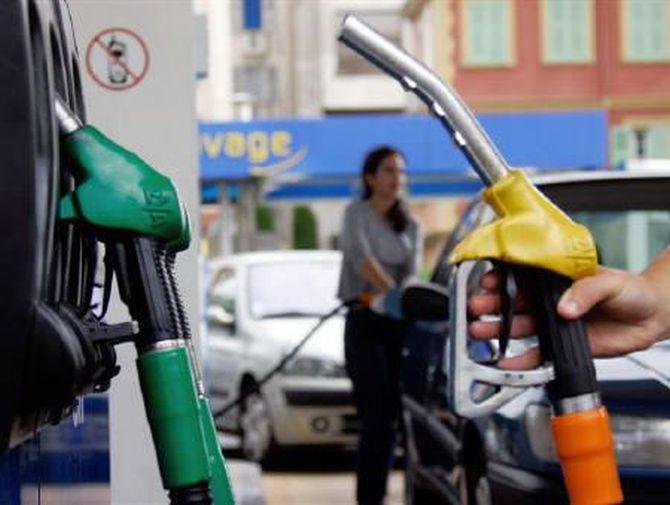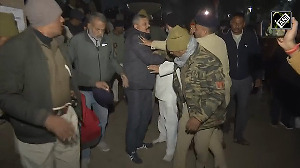Petrol and diesel prices were cut by Rs 2 per litre each as state-owned oil companies ended a nearly two-year-long hiatus in rate revision, just hours before the general election schedule is announced.

The revised price will be applicable from 6 am on Friday, March 15, the oil ministry said on Thursday evening.
Petrol in the national capital will now cost Rs 94.72 a litre compared to Rs 96.72 per litre currently while diesel prices will be Rs 87.62 against Rs 89.62 at present.
The government had nearly a decade back freed petrol and diesel prices from its control and the rates till now were fixed and announced by oil companies.
But on Thursday, the Ministry of Petroleum and Natural Gas took to X to announce the rate revision that came just hours before the schedule for the general elections was due to be announced that would set in motion a poll code, which bars making announcements that could lure voters.
The price cut came a week after a Rs 100 per cylinder reduction in cooking gas LPG price was announced.
That reduction brought down the rates of LPG for common users to Rs 803 per 14.2-kg cylinder and that for the poor, who got free connections under the Ujjwala scheme, to Rs 503 after accounting for Rs 300 per bottle subsidy that the government gives.
"Oil Marketing Companies (OMCs) have informed that they have revised Petrol and Diesel Prices across the country. New prices would be effective from 15th March 2024, 06:00 AM," the ministry said.
Petrol in Mumbai will cost Rs 104.21 a litre from Friday, Rs 103.94 in Kolkata and Rs 100.75 in Chennai. A litre of diesel will be priced at Rs 92.15 in Mumbai, Rs 90.76 in Kolkata and Rs 92.34 in Chennai.
Rates differ from state to state, depending on the incidence of local taxes.
Local sales tax or VAT is the highest among metros in BJP-ruled Maharashtra and lowest in Delhi.
"Reduction in petrol and diesel prices will boost consumer spending and reduce operating costs for over 58 lakh heavy goods vehicles running on diesel, 6 crore cars and 27 crore two-wheelers," the ministry said.
Reduced petrol and diesel prices will benefit the citizens through more disposable income, boost for tourism and travel industries, control over inflation, increased consumer confidence and spending, reduced expenses for businesses dependent on transportation, enhanced profitability for logistics, manufacturing, and retail sectors, and reduced outgo for farmers on tractor operations and pump sets, it added.
International oil prices have been turbulent in the last couple of years. It dipped into the negative zone at the start of the pandemic in 2020 and swung wildly in 2022 - climbing to a 14-year high of nearly $140 per barrel in March 2022 after Russia invaded Ukraine, before sliding on weaker demand from top importer China and worries of an economic contraction.
But for a nation that is 85 per cent dependent on imports, the spike meant adding to already elevated levels of inflation and derailing the economic recovery from the pandemic.
So, the three state-owned fuel retailers - Indian Oil Corporation (IOC), Bharat Petroleum Corporation Ltd (BPCL) and Hindustan Petroleum Corporation Ltd (HPCL) froze petrol and diesel prices for the longest duration in the last two decades.
They stopped daily price revision in early November 2021 when rates across the country hit an all-time high, prompting the government to roll back a part of the excise duty hike it had effected during the pandemic to take advantage of low oil prices.
The freeze continued into 2022 but the Russia-Ukraine war-led spike in international oil prices prompted a Rs 10 a litre hike in petrol and diesel prices from mid-March 2022 before another round of excise duty cut rolled back all of the Rs 13 a litre and Rs 16 a litre increase in taxes on petrol and diesel done during the pandemic.
That followed the current price freeze, which began on April 6, 2022, and will end with a revision in rates effective Friday.
The three firms had till now resisted calls to revert to daily price revision and pass on softening in rates to consumers on grounds that prices continue to be extremely volatile - rising on one day and falling on the other - and that their past losses have not been fully recouped.
The three companies, which control roughly 90 per cent of India's fuel market, 'voluntarily' have not changed petrol, diesel and cooking gas (LPG) prices for almost two years now, resulting in losses when input costs were higher and profits when raw material prices were lower.
But the financial numbers of the first three quarters showed them reporting bumper profit totalling over Rs 69,000 crore.
The combined net profit of IOC, BPCL and HPCL in April-December FY24 was better than their annual earning of Rs 39,356 crore in pre-oil crisis year, regulatory filings by them showed.
They posted a combined net loss of Rs 21,201.18 crore during April-September 2022 despite accounting for Rs 22,000 crore announced but not paid LPG subsidy for the previous two years.
Subsequent softening of international prices and government giving out LPG subsidies helped IOC and BPCL post annualised profit for 2022-23 (April 2022 to March 2023 ) but HPCL was in the red.
This fiscal year, things have changed dramatically.
The three firms posted record earnings in the first two quarters (April-June and July-September) when international oil prices - against which domestic rates are benchmarked - almost halved to $72 a barrel from a year ago.
International prices rose again in the subsequent quarter to $90, leading to a moderation of their earnings.
They are now hoovering in $82-83 a barrel range.
The fuel price freeze that began on April 6, 2022, had a loss as high as Rs 17.4 a litre of petrol and Rs 27.7 per litre of diesel for the week ended June 24, 2022.
However, subsequent softening led to losses being eliminated.
The three firms had a margin of Rs 11 a litre on petrol and a loss of Rs 2-3 a litre on diesel.











 © 2025 Rediff.com -
© 2025 Rediff.com -